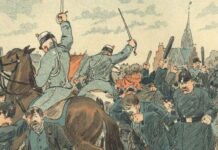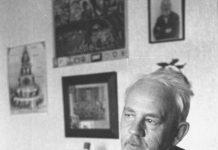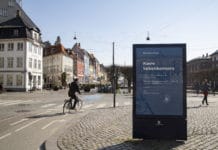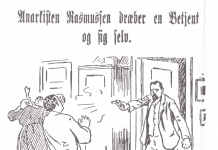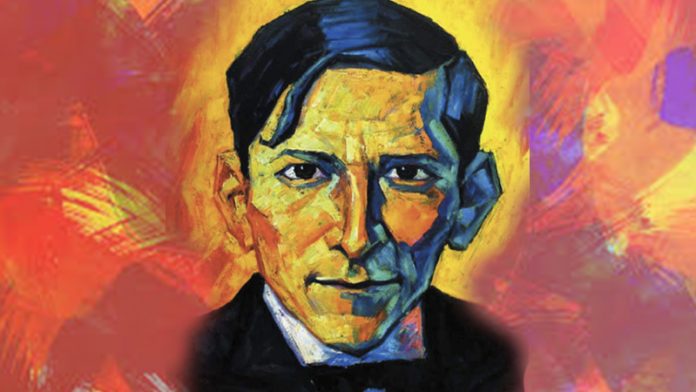
Socialistisk Biblioteks Tidslinje med links til begivenheder og personer i 1894.
Se også Index over personer, organisationer/partier og værker (som bøger, malerier, mm.), steder, begivenheder, mv., der er omtalt på hele Tidslinjen, titler og indhold på emnelisterne osv.
Bladliste
Nye blade 1894:
Socialistiske Blade
Se:
Arbejderhistorisk Bladliste, under året 1894
[sta_anchor id=”18940224″ /]
24. februar 1894
Den danske kommunist og fagforeningsmand Richard Jensen fødes på Frederiksberg (dør 29. oktober 1974 i Sundby. Var borgerrepræsentant for DKP 1934-1943 og sad i partiets ledelsen 1922-1940. Hans betydning var mest som Kominterns og sovjetiske efterretningsvæsens aktiviteter med udgangspunkt i København og blandt søfolk og havnearbejdere. Idømt 16 års fængsel i 1941 for sabotage mod skibe i Frederikshavn beregnet for oprørerne/fascisterne i den spanske borgerkrig.
Links:
- Richard Jensen. Af Jesper Jørgensen (Denstoredanske)
- Richard Jensen (Leksikon.org)
- Richard Jensen (Dansk Biografisk Leksikon)
Litteratur:
Kommunist, kriminel og våbensmugler: Moskvas trofaste mand i Danmark blev H.C. Hansens ven. Af Michael Seidelin (Netavisen Pio, 10. december 2024; online på Internet Archive). Anmeldelse af Lars Halskov: Manden med de mange ansigter: Richard Jensen og den røde underverden (Politikens Forlag, 2024, 520 sider). “Richard Jensen begyndte som småkriminel og skabte et internationalt netværk af kommunistiske agenter, indtil dansk politi og Gestapo fik fingre i ham. Men eventyret fortsatte – som våbensmugler for Israel og venskab med Danmarks statsminister.”
Richard Jensen – historien om en mand: en dokumentarisk redegørelse for en eventyrlig skæbne, der kulminerede med en straf på 16 års fængsel med afsoning i Vridsløselille Statsfængsel under Anden Verdenskrig. Af Erik Nørgaard (Holkenfeldt, 2007, 268 sider)
Ud af mørket I–II. Af Jan Valtin (Priors Forlag, 1946). Richard Jensens svar var bogen: Frem i lyset – Jan Valtin Gestapo-agent nr. 51 (Priors Forlag, 1946).
Richard Jensens livslange modsætningsforhold til Aksel Larsen er skildret i bogen: Aksel Larsen og Gestapo: sandheden om dansk politiks største hasardspiller. Af Richard Jensen (Eget Forlag, 1967).
En omtumlet tilværelse (Fremad, 1957). Erindringer.
[sta_anchor id=”18940527″ /]
27. maj 1894
Den amerikanske venstreorienterede krimiforfatter Dashiell Hammett fødes. (Dør 10. januar 1961, se denne)
[sta_anchor id=”18940614″ /]
14. juni 1894
Den peruvianske marxist José Carlos Mariátegui fødes i Moquegua i det sydlige Peru (dør 16. april 1930 i Lima).
Se:
- Mariategui, José Carlos (Leksikon.org). Intro-artikel på dansk.
- José Carlos Mariátegui (Wikipedia.org)
- José Carlos Mariátegui (Marxists Internet Archive). With Works, Biographical data, Photos, incl. Virtual Tour of the J. C. Mariátegui House, Lima.
Mariátegui og latinamerikansk marxisme. Af Lance Selfa (Kritisk Debat, august 2019). “I denne artikel håber jeg at kunne gøre op med noget af den anonymitet, der omgærder Mariátegui, for hans bidrag til marxismen kommer fuldt på højde med hans mere velkendte samtidige: Leon Trotsky, Rosa Luxemburg, Antonio Gramsci og Gerorg Lukács for at nævne nogle få.” In English below.
José Carlos Mariátegui was the great pioneer of Latin American Marxism. By Mike Gonzalez (Jacobin, February 14, 2023). “The Peruvian thinker José Carlos Mariátegui recognized the need to adapt Marxism for Latin American conditions instead of merely copying Europe.”
José Carlos Mariátegui: Pioneering Latin American Marxist. By Marck Becker (Against the Current, Issue 209, November-December 2020). “Although Mariátegui was active a century ago, he leaves us with many ideas and lessons that are still relevant. His ideas of a national Marxism underscore the necessity of adapting ideas and theories to local realities.”
José Carlos Mariátegui: Selected Essays (pdf) (LeftWord, 2020, 80 p.). “This volume collects three of Mariátegui’s texts along with an introduction by the Brazilian Marxist intellectual Florestan Fernandes and a preface by the collective from the Escuela José Carlos Mariátegui.”
Mariátegui, José Carlos (1894–1930) (pdf). By Carlos Cruz MosqueraThe Palgrave Encyclopedia of Imperialism and Anti-Imperialism; ed. Immanuel Ness and Zak Cope, 2019, 7 p.). “José Carlos Mariátegui is considered to be the founder of Marxism in the
region on the grounds that he was the first to adapt it to local conditions.”
In the Red Corner: The Marxism of José Carlos Mariátegui. By Orlando Hill (Counterfire, February 6, 2020). Review of Mike Gonzalez’ book (Haymarket, 2019, 331 p.). “[The book] recovers José Carlos Mariátegui’s Marxist understanding of Latin America in the context of the development of capitalism.” See also review by Marck Becker: The life of José Carlos Mariátegui (Monthly Review, Vol.71, No.9, February 2020) + review by Jean-Pierre Reed (Marx & Philosophy Review of Books, 30 March 2020) + Deni Alfaro Rubbo: Mariátegui in debate: Marxist ghosts and critical horizon (Spectre, April 19, 2021) + Einar Braathen: Engasjerende om original marxist i Latin-Amerika (Gnist: marxistisk tidsskrift, nr.3, 2020).
Mariátegui: a Peruvian Marxist for our time. By Mike Gonzalez (OpenDemocracy, 4 October 2019). “In the 20s of the last century, Mariátegui strove to start building a revolution. Today his ideas remain more valid than ever, and his creative reading of Marxism has much to contribute.”
Mariátegui’s heroic socialism. By Michael Löwy (Jacobin, December 15, 2018). “José Carlos Mariátegui was Latin America’s most original Marxist. And his work is strikingly relevant for confronting the continent’s right-wing backlash today.”
Beyond Eurocentrism: on José Carlos Mariátegui. By Aníbal Quijano (Verso, Blog, 17 August 2018). “In this text, an introduction to José Carlos Mariátegui’s essential writings on socialist politics and culture, published in 1991, underscores the powerful influence that Mariátegui held over the theoretical development of Latin American critical thought.” In Danish above.
Jose Carlos Mariategui: Welding Marxism and Indigenism in Latin America today. By Carlos Cruz Mosquera (Journal of Labor and Society, Vol.21, No.1, March 2018). “Writing in the early twentieth century, Jose Carlos Mariategui was the first Latin American intellectual to combine Marxist theory with Indigenism, earning him criticism from his contemporaries who saw it as a deviation.”
The heroic deed: myth and revolution. By Doug Enaa Greene Links: International Journal of Socialist Renewal, April 21, 2016). “As Mariategui saw it, the task of revolutionaries was to apply Marxism to the situation at hand in order to make a concrete investigation of Peru (and the wider world).” Scroll down to section III: Mariategui.
José Carlos Mariátegui 85 years later. By Marc Becker (Telesur, 15 April 2015). “Mariategui’s funeral was one of the largest processions of workers ever seen in the streets of Lima, Peru, but in the U.S. his death was hardly noticed.”
Mariátegui and Latin American Marxism. By Lance Selfa (International Socialist Review, Issue 96, Spring 2015, p.45-72). “In this article, I hope to combat at least some of the anonymity that Mariátegui faces, because his contributions to Marxism stand on the level of his more well-known contemporaries: Leon Trotsky, Rosa Luxemburg, Antonio Gramsci, and Georg Lukács, to name a few.” In Danish above.
Mariátegui and the Permanent Revolution. Part One. By José Pereira (In Defence of Marxism, 4 October 2013) + Part Two (15 October 2013). “Here José Pereira puts the record straight explaining how this great Latin American Marxist, in spite of some errors, had reached the same general conclusions as Lenin and Trotsky on the fundamental questions facing the revolution in colonial countries.”
The Marxism of José Carlos Mariátegui. By Paul Hampton (Workers’ Liberty, 27 February 2012). “… there is a rich and authentic tendency of Latin American Marxism, in which Jose Carlos Mariátegui is probably the brightest star. His contribution during the third decade of the twentieth century has rightly earned him the epitaph of Latin America’s Gramsci.”
José Carlos Mariátegui: An Anthology. By Jonathan Collier (Socialist Review, Issue 365, January 2012). Review of Harry E Vanden and Marc Becker’s (eds.) book (Monthly Review Press, 2011, 480 p.). See also review by Dan La Botz: Latin American Marxist (New Politics, Issue 53, Summer 2012).
Indigenous resistance in the Americas and the legacy of Mariátegui. By Roxanne Dunbar-Ortiz (Monthly Review, Vol.61, No.4, September 2009). “Mariátegui accepted the fact that Indigenous peoples were nationalities and had the right to self-determination, but believed liberation and socialism – Indigenous socialism – would come from struggles of the Indigenous, peasants, and urban workers in unison.”
José Carlos Mariátegui: Latin America’s forgotten Marxist (International Socialism, Issue 115, Summer 2007, p.69-86). “Revival of anti-capitalist struggle in Latin America has resurrected interest in the ideas of a Peruvian revolutionary of the 1920s, Mariategui. Mike Gonzalez looks at one of the most innovative Marxists.”
Mariátegui, the Comintern, and the indigenous question in Latin America (pdf). By Marc Becker (Science and Society, Vol.70, No.4, October 2006, p.450-479; online at Yachana.org). “This essay extends an examination of the Comintern’s discussion of race and nationalism in other areas of the world to Latin America, and in this process challenges our understandings of the role of one of Latin America’s leading Marxist figures.”
Mariátegui and Latin American Marxist theory. By Marc Becker (Ohio University/Latin American Series, No.20, 1993, 214 p.; online at Yachana.org). “This volume reviews the essential elements of Mariátegui’s thought and important influences on his intellectual development. It demonstrates the role he played in defining a Latin American identity, the nature of his intellectual contribution to the development of indigenous revolutionary movements in Latin America …”
Mariátegui. By Louis Proyect (Marxmail.org). “Mariátegui is the Western Hemisphere’s most influential Marxist thinker. He compares favorably to Gramsci because of his ability to understand and write about class relations in a fresh and creative manner.” 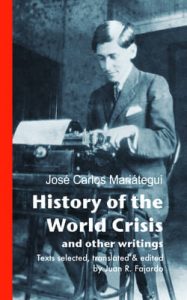
Litteratur:
History of the World Crisis and Other Writings. By José Carlos Mariátegui (Published by
Marxists Internet Archive Publications; Erythros Press and Media, LLC, 2017, 212 p.).
Se også:
Machete and Sickle. By David Broder (Jacobin, March 2, 2019). “One hundred years ago, the Third International inspired the creation of communist parties across Latin America. Yet only its demise would liberate them from stifling Russian control.”
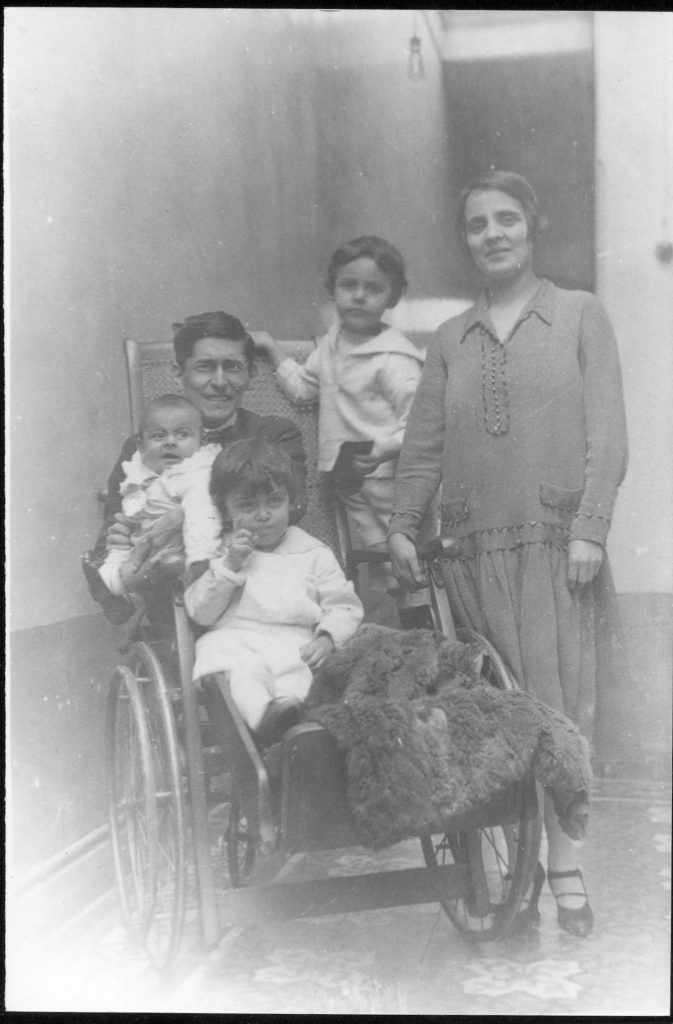
[sta_anchor id=”18940627″ /]
27. juni 1894
Socialdemokratiets stifter, Louis Pio dør i Chicago, Ill, USA (Født 14. december 1841 i Roskilde). Emigrerede til USA, 23. marts 1877, se denne dato om “førernes flugt til Amerika”
Efter hans død overføres urnen i 1921 til Vestre Kirkegård. Se gravsted.dk: Louis Pio
Se også på Socialistisk Bibliotek:
- Tidslinjen: 22. maj 1871,
- Tidslinjen: 22. juli 1871
[sta_anchor id=”18940909″ /]
9. september 1894
Poul Henningsen (PH) fødes i Ordrup. (Dør 31. januar 1967 i Hillerød) (Se også under “Andre beværkelsesværdige” i Bispebjerg Kirkegård, Progressive personer, på Socialistisk Bibliotek).
Biografisk:
- Henningsen, Poul (Leksikon.org).
- Poul Henningsen (Denstoredanske.dk).
- Poul Henningsen (Wikipedia.dk). Med links og litteratur.
- Poul Henningsen. Af Carl Erik Bay (Dansk Biografisk Leksikon, 3. udg.). Længere artikel.
- Praktisk radikalisme – Poul Henningsen. Af Søren Schou + Jazz, humør, holdning – PH-revyerne. Af Birgitte Hesselaa (Dansk Litteraturs Historie 1920-1960, bd. 4, s.304-318 + s.323-332).
‘Man binder os på mund og hånd’; fra revy-komedien Dyveke (1940). Tekst og kommentar af Poul Henningen, fremført af Liva Weel (YouTube, 4:17 min.).
Se også: Man binder os på mund og hånd – besættelse og censur. Af Birgitte Hellselaa (Dansk litteraturs historie, bind 4, side 320-322) + sangtekst (Danskesange.dk). Flere links om sangen Man binder…: se Tidslinjen 31. maj 1940.
Links:
Er PH ikke lidt overvurderet? Af Henning Tjørnehøj (Politiken.dk/Kronik, 9. september 2014). “Poul Henningsen bliver fejret som dansk nationalhelt – også nu, hvor han ville være blevet 120. Men var den kulturradikale spradebasse var slet ikke den lysende helgen, man vil gøre ham til.”
At udgrave Poul Henningsen med teske (pdf). Af Hans Hertel (Magasin fra Det Kongelige Bibliotek, nr. 1, 2014, s.14-20; online på Tidsskrift.dk). Takketale ved modtagelsen af H.O. Lange-prisen 2013.
Kulturkamp – et portræt af Poul Henningsen (Modkraft/Kontradoxa, 21. august 2003). “Poul Henningsen (1894-1967) nåede mens han levede at blive et begreb, som man kunne henvise til med en forkortelse: PH. Lidt forkortet kunne man sige, at han blev en levende myte. I dag er han yndlingshadeobjekt for højrefløjen.”
“Poul Henningsen” (Demos Nyhedsbrev, nr. 74, sommer 2003, side 18-21) (Serie: Kulturradikalismen). Om PH kulturhistorisk, og især om forholdet til DKP: “… en af de få Sovjet-kritikere, som for alvor ønskede en dialog med kommunisterne, selvom han ikke fik den.” Scroll ned til nummer (pdf til download).
Radikaleren mellem socialdemokrati og kommunistparti: Poul Henningsens kulturkritik (pdf) (Kultur og Klasse, nr. 34, 1979, s.12-27; online på Tidsskrift.dk). “Poul Henningsens kulturkritik er en alliance mellem intellektuelle og arbejderklassen i kampen imod småborgerligheden, kapitalen og kommunismens undertrykkelse af de demokratiske rettigheder. Det centrale grundlag for denne kamp søges i kunsten og i pædagogikken, mens enhver form for klasseorganisering lades ude af betragtning.”
Litteratur:
Sandheden er altid revolutionær. Tekster 1918-1967. Af Poul Henningsen. Et udvalg redigeret af Olav Harsløf (Hans Reitzel, 1980, 176 s.).
PH – En biografi. Af Hans Hertel (Gyldendal, 2012, 566 s.) + Poul Henningsen dengang og nu: Lysmageren i nyt lys. Red. Hans Hertel (Gyldendal, 2012, 428 s.). “[Bogen] præsenterer en PH uden sminke, langt mere sammensat end sit image. PH som multikunstner, rigsvækker og offentlig figur fra Kritisk Revy’s muntre oprør, over 30’ernes revyer og kulturkamp mod nazismen frem til koldkrigsårenes debatter om demokrati, skole, seksualitet, pop og industridiktatur.” Se udsnit af bogen på Gyldendal.
Anmeldelser mv.:
- 1.000 sider PH. Af Morten Thing (Modkraft.dk/Kontradoxa, 12. juli 2013). “Uenighed gør stærk, påpegede Poul Henningsen. Men uenighed skal også udfoldes på et vist niveau. Det gør Hans Hertel i bog om PH, men ikke alle bidragsydere i supplerende debatbog.”
Anmeldelsen også trykt i Arbejderhistorie, nr. 1, 2013, side 89-92 (PDF-fil) - Den omfattende ensomme ånd. Af Erik Skyum-Nielsen (Information.dk, 18. oktober 2012). “Guldgrube. Hans Hertels værk om PH er forskningsmæssigt en milepæl – og sammen med den tilhørende antologi en guldgrube af eftertanker.”
- Lysmagerens mørke side. Af Kasper Lundberg (Information.dk, 14. oktober 2012). Interview med Hans Hertel: “Med sin vippende cigaret i flaben blev samfundsrevseren og designeren Poul Henningsen en regulær folkehelt. Men litteraturprofessor Hans Hertel vil i en ny biografi give os hele billedet af PH – også lysmagerens mørke.”
Se også:
- Kulturradikalismen – dengang og nu (FaktaLink, 2012/2014).
Se også på Socialistisk Bibliotek:
- Tidslinjen 1. juli 1926 om tidsskriftet Kritisk Revy.
- Tidslinjen 29. april 1935 om PH’s Danmarksfilm.
- Linkboxen Kulturradikalismen
- Indskannede tekster: Kulturradikalismen: to artikler, af Elias Bredsdorff (1955, 16 sider).
- Indskannede tekster: De kulturradikale tidsskrifter, af Morten Thing (1993).
- Indskannede tekster: Kulturkamp i Danmark, af Georg Moltved (1953).
















